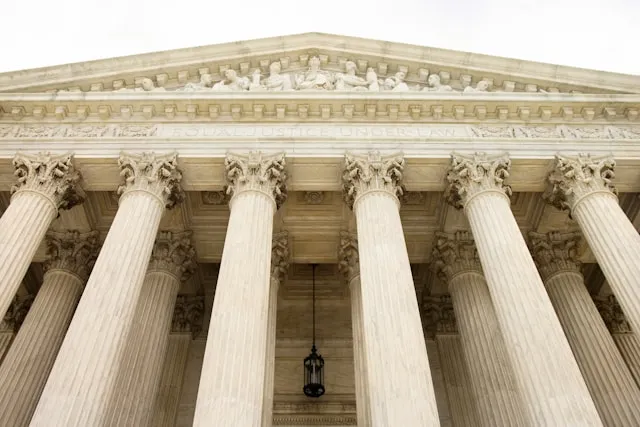North Dakota urges Supreme Court to leave in place decision that could limit the power of the Voting Rights Act


Lawyers for North Dakota on Tuesday urged the court to leave in place a decision by the U.S. Court of Appeals for the 8th Circuit that two Native American tribes (along with individual voters) say could “knee-cap Congress’s most important civil rights statute” – the federal Voting Rights Act. The court of appeals held that private plaintiffs cannot rely on federal civil rights laws to challenge discrimination under Section 2 of the VRA, which prohibits racial discrimination in voting. The state contended that pausing the 8th Circuit’s ruling “would have the extraordinary effect of requiring North Dakota to hold two consecutive elections using a court-imposed map that the Eighth Circuit has now determined should never have been imposed to begin with.”
The plaintiffs in this case – the Turtle Mountain Band of Chippewa Indians, the Spirit Lake Tribe, and three Native American voters – brought this lawsuit in federal court in North Dakota against North Dakota’s secretary of state. They contended that a state legislative map adopted in 2021 diluted the voting power of Native Americans, in violation of Section 2. The 2021 map had eliminated two of the three legislative districts in the northeastern part of North Dakota in which Native American voters had the ability to elect their own candidates.
Chief U.S. District Judge Peter Welte agreed that the 2021 map violated Section 2. He gave the state just over a month to propose a new map that would correct the violation; when it did not do so, Welte instructed the state to adopt a map created by the plaintiffs. North Dakota used that map in the November 2024 elections, leading to the election of three Native American legislators.
North Dakota went to the 8th Circuit, which – by a vote of 2-1 – threw out Welte’s decision. In a decision by Judge Raymond Gruender, the court of appeals ruled that private plaintiffs like the tribes and the voters cannot use federal civil rights laws to bring lawsuits alleging violations of Section 2. And under a 2023 decision by the same court, the majority noted, private plaintiffs cannot bring a lawsuit directly under Section 2.
Chief Judge Steven Colloton, a George W. Bush appointee who was on a list of potential Supreme Court nominees released by then-candidate Donald Trump in 2016, dissented. He would have allowed the plaintiffs to bring their lawsuit and upheld Welte’s ruling on the merits.
After the full 8th Circuit declined to reconsider the case, the plaintiffs went to the Supreme Court on July 15, asking the justices to temporarily block the 8th Circuit’s decision from going into effect two days later. The plaintiffs argued that unless the court intervened, one of the plaintiffs – who was elected to the state’s legislature in 2024 – could become ineligible to serve because she does not live in the 2021 map’s version of her district. Moreover, they added, if the 8th Circuit’s decision is allowed to stand, the plaintiffs will “face irreparable harm if a decidedly unlawful map governs the 2026 election.”
On July 16, Justice Brett Kavanaugh granted their request for an administrative stay – an order temporarily blocking the implementation of the 8th Circuit’s decision to give the justices time to consider the plaintiffs’ request.
In its brief on Tuesday, North Dakota acknowledged that “many courts have uncritically assumed” that private plaintiffs can bring a lawsuit to enforce vote-dilution claims under Section 2 of the VRA. “But,” it stressed, “assumptions are not holdings. And the fact that Section 2’s private enforceability was not previously challenged does not mean Congress spoke with the clarity needed to create a privately enforceable right.” To the contrary, the state emphasized, in two “deliberate and thoroughly reasoned” opinions, the 8th Circuit concluded that Section 2 “does not reflect a clear intent for vote dilution claims to be privately enforced, whether under Section 2 itself or through Section 1983.”
The Supreme Court, the state told the justices, “should follow the normal course and allow the Eighth Circuit’s judgment to take effect unless and until” the court grants review “and has had the opportunity to fully consider the merits of” the lower court’s “rigorous analysis.”
Posted in Court News, Emergency appeals and applications
Cases: Turtle Mountain Band of Chippewa Indians v. Howe